- About
- Our Members
- Scholars
- Scholar Alums
- Scholar Research and Accolades
- Partners
-
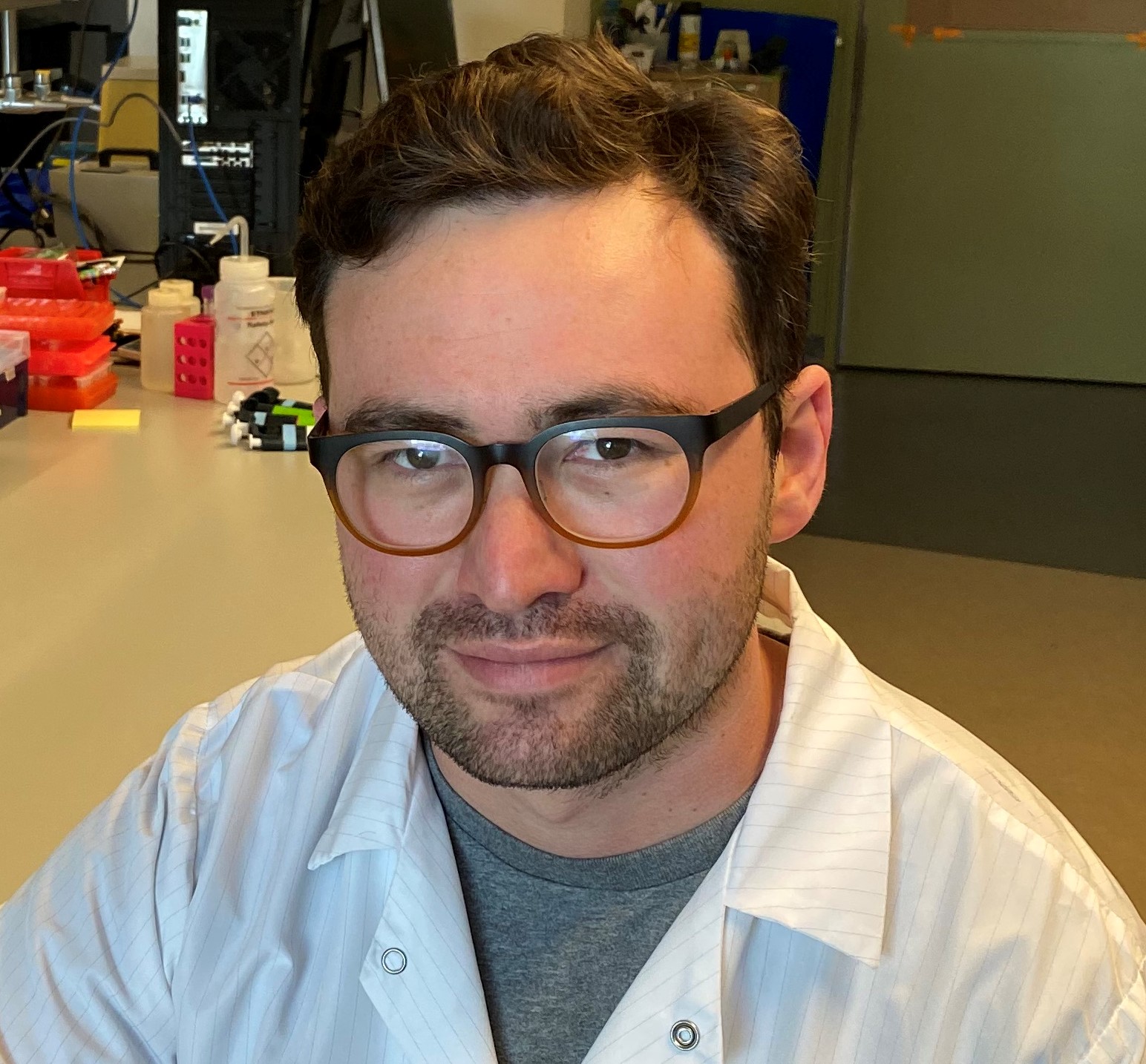 Jeremiah Tsyporin, University of California, Santa Cruz“As I enter the final year of my PhD, I am beginning to look for mentors to oversee my post-doctoral training. One of the significant ways I can find a mentor is through the networking opportunities offered at conferences. Without this generous support, these opportunities to share my work with the greater neuroscience community would have been impossible for me. In addition to attending conferences and connecting with neuroscientists worldwide, support from ARCS has helped ease the economic burdens associated with the cost of living in Santa Cruz. Because I don’t have to focus so heavily on dealing with basic needs, I have the freedom to spend more time and mental energy focused on research and intellectual pursuits central to a successful PhD.”
Jeremiah Tsyporin, University of California, Santa Cruz“As I enter the final year of my PhD, I am beginning to look for mentors to oversee my post-doctoral training. One of the significant ways I can find a mentor is through the networking opportunities offered at conferences. Without this generous support, these opportunities to share my work with the greater neuroscience community would have been impossible for me. In addition to attending conferences and connecting with neuroscientists worldwide, support from ARCS has helped ease the economic burdens associated with the cost of living in Santa Cruz. Because I don’t have to focus so heavily on dealing with basic needs, I have the freedom to spend more time and mental energy focused on research and intellectual pursuits central to a successful PhD.” -
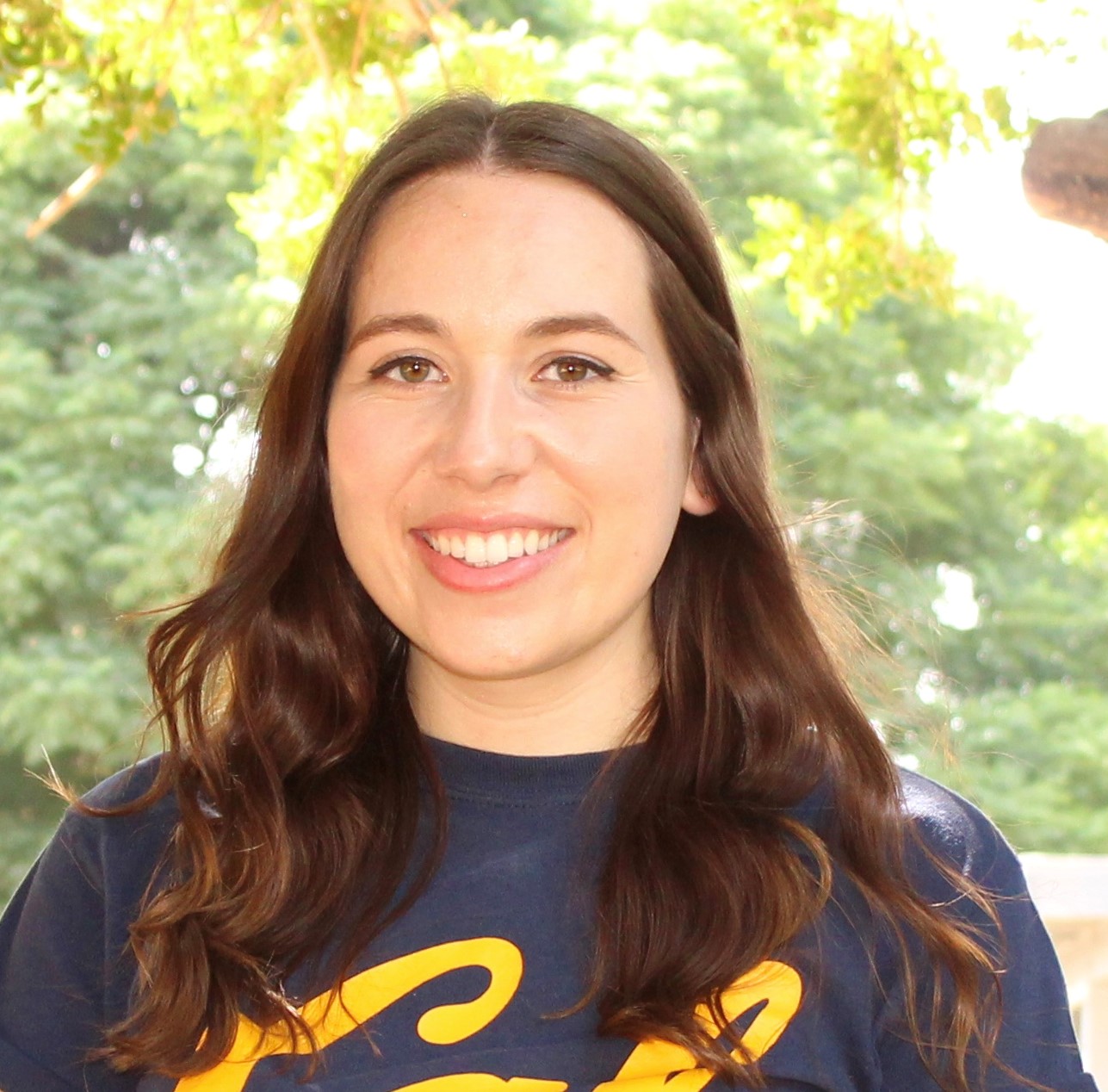 Rachelle Stark, University of California, Berkeley“I grew up in a low-income community in San Bernardino, California where I directly saw the harsh reality of how diet contributes to many diseases (diabetes, cardiovascular disease, obesity, etc.). These preventable diseases tragically took the lives of many people in my community. For these reasons, doing research related to nutrition/metabolism is extremely important and fulfilling to me. The [ARCS Award] gives me more options for labs because I will not have to rely on the funding of the lab I choose and can instead choose a lab purely based on my research interests. The funding will also give me more time to work on the research that I find so important and fulfilling.”
Rachelle Stark, University of California, Berkeley“I grew up in a low-income community in San Bernardino, California where I directly saw the harsh reality of how diet contributes to many diseases (diabetes, cardiovascular disease, obesity, etc.). These preventable diseases tragically took the lives of many people in my community. For these reasons, doing research related to nutrition/metabolism is extremely important and fulfilling to me. The [ARCS Award] gives me more options for labs because I will not have to rely on the funding of the lab I choose and can instead choose a lab purely based on my research interests. The funding will also give me more time to work on the research that I find so important and fulfilling.” -
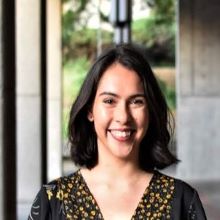 Katherine Montana, San Francisco State University“I will be pursuing my master’s degree in integrative biology at San Francisco State University and conducting my research at the California Academy of Sciences. I am thrilled to get started on my research and mentoring projects. … This combination of research activities will offer me the opportunity to build my technical lab skills, storytelling abilities, and capacity to help other students succeed in science. ... I am deeply honored to receive the [ARCS Award] and take great joy in starting graduate school. I thank you for making this possible for me. I am ready to get to work.”
Katherine Montana, San Francisco State University“I will be pursuing my master’s degree in integrative biology at San Francisco State University and conducting my research at the California Academy of Sciences. I am thrilled to get started on my research and mentoring projects. … This combination of research activities will offer me the opportunity to build my technical lab skills, storytelling abilities, and capacity to help other students succeed in science. ... I am deeply honored to receive the [ARCS Award] and take great joy in starting graduate school. I thank you for making this possible for me. I am ready to get to work.” -
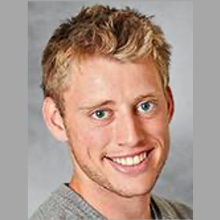 Micah Swann, University of California, Davis“I’m conducting applied limnological research on the pristine lakes of Northern Patagonia, in collaboration with Fundación Chile Lagos Limpios. This model will be used to investigate how the physics and water quality of these pristine lakes wi1l be impacted by climate change and watershed development over the course of the 21st century. In September 2019, I had my first opportunity to visit Northern Patagonia … but due to Covid-19 safety and travel restrictions, I have not had the opportunity to return to Chile. With your financial support, I will be able to return to the region in January 2022 and continue collecting data to improve the accuracy of the lake model under development.”
Micah Swann, University of California, Davis“I’m conducting applied limnological research on the pristine lakes of Northern Patagonia, in collaboration with Fundación Chile Lagos Limpios. This model will be used to investigate how the physics and water quality of these pristine lakes wi1l be impacted by climate change and watershed development over the course of the 21st century. In September 2019, I had my first opportunity to visit Northern Patagonia … but due to Covid-19 safety and travel restrictions, I have not had the opportunity to return to Chile. With your financial support, I will be able to return to the region in January 2022 and continue collecting data to improve the accuracy of the lake model under development.” -
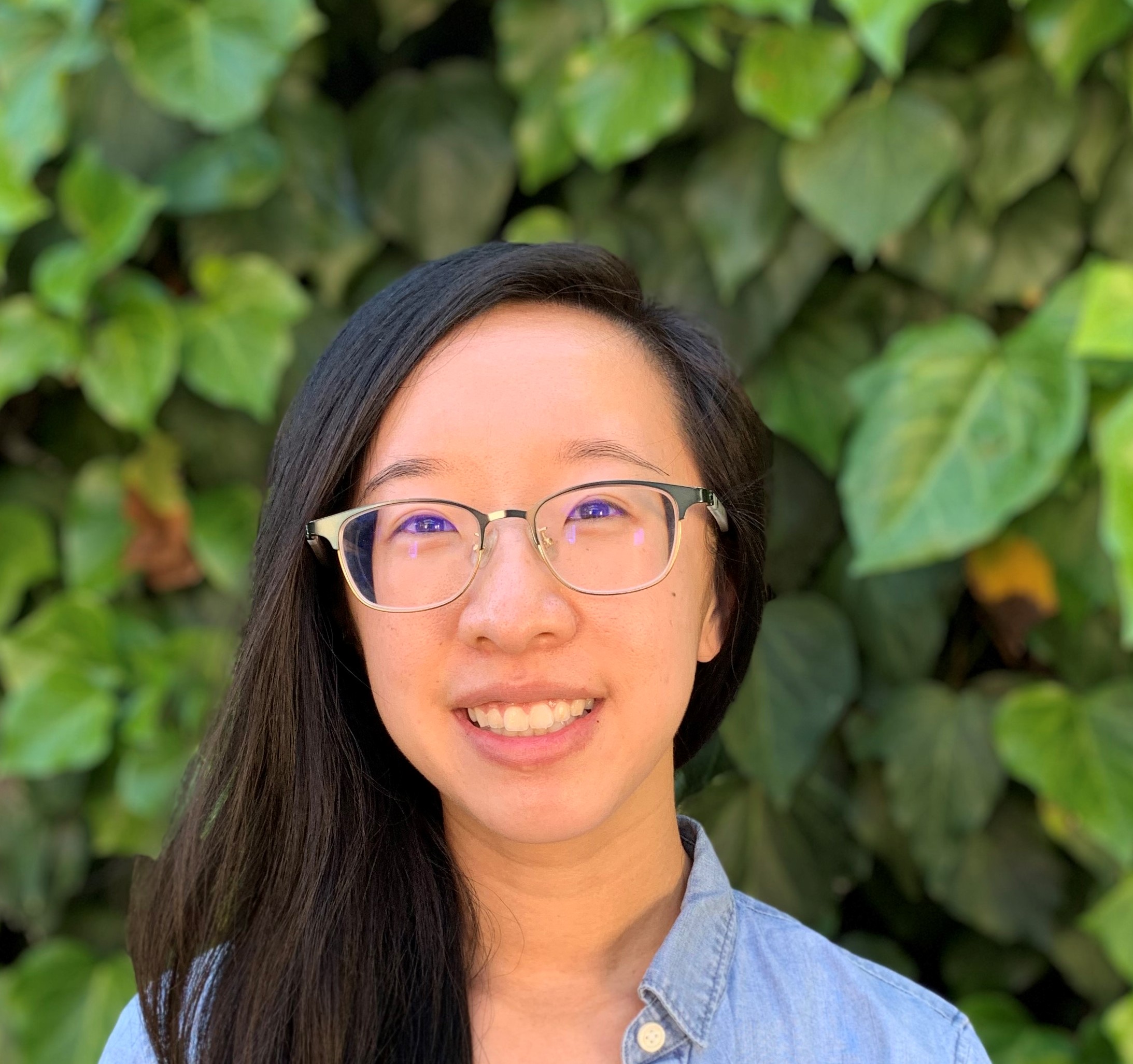 Julie Chang, Stanford University“The ARCS Award will allow me to focus on my PhD studies without worrying about finances. My research focuses on understanding the physics of breast cancer cell migration using 3D hydrogels and time-lapse imaging. The PhD journey itself has been a rollercoaster and I’m excited to finally see the light at the end of the tunnel! After my PhD, I am hoping to land a role as a clinical scientist in the biotech industry in the Bay Area. In this role, I can help analyze and interpret clinical trial data to develop drugs that can cure human diseases. Thank you again for the ARCS award—funding the next generation of scientific thinkers is truly an impactful mission!”
Julie Chang, Stanford University“The ARCS Award will allow me to focus on my PhD studies without worrying about finances. My research focuses on understanding the physics of breast cancer cell migration using 3D hydrogels and time-lapse imaging. The PhD journey itself has been a rollercoaster and I’m excited to finally see the light at the end of the tunnel! After my PhD, I am hoping to land a role as a clinical scientist in the biotech industry in the Bay Area. In this role, I can help analyze and interpret clinical trial data to develop drugs that can cure human diseases. Thank you again for the ARCS award—funding the next generation of scientific thinkers is truly an impactful mission!” -
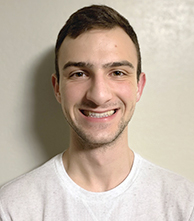 Nicholas Elder, University of California, San Francisco (UCSF)“I am grateful to earn my degree at UCSF which is world-renowned for its stem cell research. Likewise, it has been a pleasure to be supported by the ARCS Foundation and wider community. Research is a costly endeavor and being awarded this fellowship has given me the time and space to focus on impactful research while also sharing it with an interested group of donors and other scholars. The fellowship has also been a reassurance. This fall, my supervisor announced that he was leaving academia for an industry position. As I searched for a new supervisor and lab in which to complete my research, I knew that I had financial support to ease my transition.”
Nicholas Elder, University of California, San Francisco (UCSF)“I am grateful to earn my degree at UCSF which is world-renowned for its stem cell research. Likewise, it has been a pleasure to be supported by the ARCS Foundation and wider community. Research is a costly endeavor and being awarded this fellowship has given me the time and space to focus on impactful research while also sharing it with an interested group of donors and other scholars. The fellowship has also been a reassurance. This fall, my supervisor announced that he was leaving academia for an industry position. As I searched for a new supervisor and lab in which to complete my research, I knew that I had financial support to ease my transition.”
Scholar Alums
ARCS Foundation Scholar Alums, We’d Like to Hear from You!
You are a vital part of our mission. Your stories encourage current scholars and help us attract new funding for future scholars.
Stay involved with ARCS Foundation members and other scholars if you have moved to the Bay Area or want to give back in any way, including speaking about your research at an ARCS Foundation event.
Let us know how you would like to participate in carrying ARCS® Foundation, Inc. work into the future: ncalifornia@arcsfoundation.org.
To notify the Northern California Chapter that you are in the area, please email or write to us at the above address. To update your information, use the Member & Scholar Login to access your account. To learn more about speaking at or hosting an event, click here.
See ARCS Scholars From Past Years
Keeping Up With ARCS Scholars
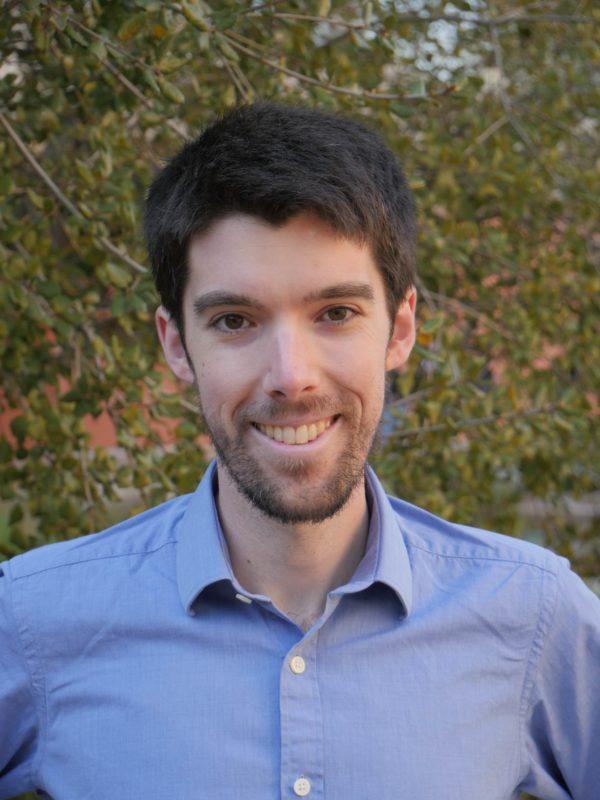 Daniel Swain
Daniel SwainARCS Scholar Alum
Disasters may come with some warning, but often not. That’s why Daniel Swain, PhD, keeps his schedule flexible. Swain is a science communicator who worked nonstop giving interviews and posting online during last winter’s widespread and disastrous fires in the Los Angeles area.
Swain appeared on CNN to explain the science behind how the mix of dry vegetation, canyons that were “like blowtorches” during the Santa Ana winds, and the closely built residences combined to produce unmanageable fires. When well-known astrophysicist and ARCS Scholar Alum Neil deGrasse Tyson wanted to understand the science of the disaster, his team called Swain to do a podcast episode specific to the fires. “Complex events, disasters in particular, never have a singular cause,” Swain says. “Did climate change cause the LA fires? The answer is no because no one thing did; it was a confluence of factors. Was climate change a piece of the puzzle? Yes, I think there’s empirical evidence that it did play a significant role.”
Daniel is a climate scientist and researcher for the University of California Agriculture and Natural Resources as well as the UCLA Institute of the Environment and Sustainability and the NSF National Center for Atmospheric Research. An ARCS Northern California Chapter Alum, he received his undergrad degree in atmospheric science at UC Davis and his PhD in Earth System Science from Stanford. He started the Weather West blog around 20 years ago and admits some people know him as “Weather West” rather than by his actual name.
Swain says that 99.9% of the time his inbox is completely filled with requests for interviews or information. He gives his time and juggles schedules because he wants to share correct information and to reach the people “who ask discerning questions about the world and how it could be better.” He’s aware that not all sources of information are equally trustworthy.
As a trained meteorologist and a researcher with access to satellite imagery and weather radar, Swain’s hope is that providing accurate information will help offset false information and allow discussion about future decisions. “That’s a personal motivator,” he says. “This is where the rubber meets the road in terms of bringing science to action. I have a lot of sources, including publicly available sources.” Besides describing the science and accurate details of specific events, Swain also engages with the media regarding “surges in public interest or misinformation, as the case may be,” and speaks to new scientific findings or policy.
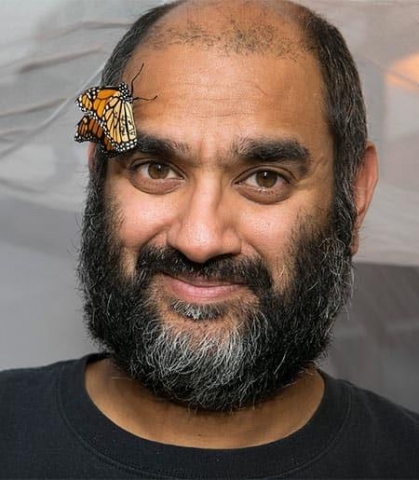 Anurag Agrawal
Anurag AgrawalARCS Scholar Alum
Dr. Anurag Agrawal was an ARCS Northern California Chapter Scholar from 1998 to 1999 while attending UC Davis, where he completed his PhD in 1999. He is now the James Perkins Professor of Environmental Studies in the Department of Ecology and Evolutionary Biology at Cornell University. His work, which unites ecology, genetics, and chemical evolution, informs sustainable agriculture and has implications for infectious disease management. Agrawal has over 300 peer-reviewed articles with over 38,000 citations. He is a fellow of the National Academy of Sciences, the Ecological Society of America, and the American Association for the Advancement of Science.
Agrawal has been selected as the 2025 inductee into the prestigious ARCS Alumni Hall of Fame.
“ARCS was at the very beginning for me as a graduate student. They take a risk on young scientists by allowing them to explore and do different things,” Agrawal says. “The great thing about American science is that we invest in students, and that is something we should not forget.”
He is renowned for discovering how plants and their predator insects evolve in a rapid “arms race,” with each surviving by rapidly adapting, at the molecular level, to the other’s threat. To avoid harmful consequences for humanity, his findings show the need to preserve entire ecosystems rather than targeting individual species’ eradication.
“One of the fundamental things we’re trying to study is to what extent organisms are preprogrammed, through their genetic makeup, to look or behave a particular way,” Agrawal says. “Genes are inherited from parents and may determine many aspects, but the environment also impacts behavior and appearance. We’re asking how much of the plant's success is based on inheritance versus the environment in which it grows.”His approach includes looking at the antagonistic interactions between insect herbivores, the changes in the plants they eat as they evolve defenses, and the impact of these changes on and by the environments in which they are found. By researching co-dependent changes in the behavior, biology, and chemistries of insects and the plants they feed on within the ecologies, he has shown the unintended consequences of human interventions that ignore this three-way dependency.
“The solution requires expanding the view of evolution toward a more comprehensive inclusion of the biochemical changes within the predator species as well as how that interacts with a changing climate,” Agrawal says. “The goal should be to conserve functioning ecosystems so all the species can thrive here.”
Outside of research, Agrawal is passionate about mentoring graduate students and fostering the next generation’s passion for science. “I think every generation thinks the next one is failing us in some ways,” Agrawal says. “That is the problem of getting old – we see that things aren’t being done the way they used to be done. However, it would be a mistake to say that things are getting worse or that young people aren’t working as hard. They’re just working differently.” He says that the new generation of scientists is bringing about change. “I think this new generation of students is awesome,” Agrawal says. “They are working hard and smart, and the landscape is changing with advents like artificial intelligence.”
He advises students to “Find the things that keep you up at night wanting to learn more. It’s easy to say that, and it is harder to do, but I suggest finding the things that give you energy,” Agrawal says. “Pursue the study of something that you find yourself telling your friends about and that brings you joy. Try different opportunities, take different classes, and meander your way into finding something that gives you energy.”
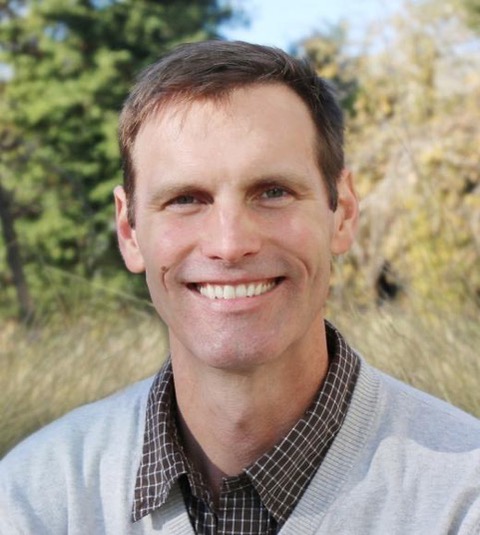
Brian Bird, MSPH, DVM, PhD
ARCS Scholar AlumDr. Bird was an ARCS NCC Scholar at UC Davis in 2006, 2008, and 2009. His record of service demonstrates his lifelong commitment to tackling complex global health challenges. During his years with the United States Centers for Disease Control and Prevention (US-CDC), Dr. Bird deployed to multiple outbreaks of Ebola virus disease in West Africa, working alongside physicians, other scientists, and responders. His leadership role in building in-country laboratory response ultimately saved countless civilian lives and earned him recognition from the US Department of State, as well as the US-CDC and his peers. Thank you to Brooke Genovese (ARCS Scholar 2022-2023) and Dr. Jonna Mazet, DVM, MPVM, PhD (UC Davis) for keeping us updated on Dr. Bird's accomplishments.
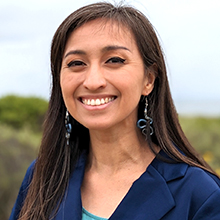 Elsie Carrillo, ARCS Scholar Alum
Elsie Carrillo, ARCS Scholar Alum
PhD Candidate, UC Santa CruzA former ARCS Scholar at UC Santa Cruz, Elsie continues to advance the field in Ecology and Evolutionary Biology. In this insightful video, Elsie discusses the intricacies of semi-aquatic life through various animal examples. Take a moment to watch!
Click here to learn more about Elsie's research.
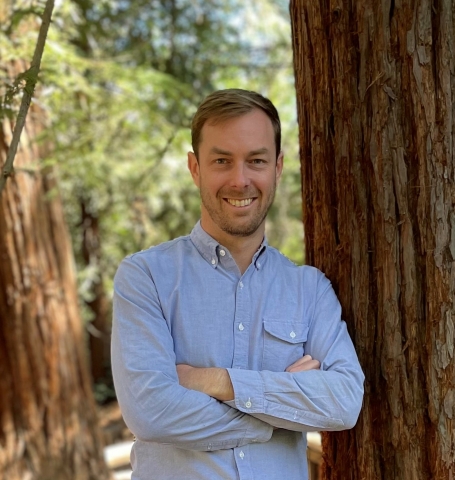 Dr. David McCollum, ARCS Scholar Alum
Dr. David McCollum, ARCS Scholar Alum
Distinguished Scientist at Oak Ridge National LaboratoryThe world needs to reach net zero carbon emissions by the year 2050 for the global temperature to stop increasing. According to the World Resources Institute, the UN found that current climate policies will raise the temperature by 2.8 degrees Celsius by the end of the century. However, UC Davis ARCS Scholar Alum David McCollum is working to prevent this reality from happening.
As a Distinguished Scientist at Oak Ridge National Laboratory, McCollum is involved in a number of U.S. and international efforts exploring the science of transitioning to a net zero emissions society. One effort is the Net Zero World Initiative, which McCollum has been part of since its inception in 2022. According to the best available science, achieving net zero emissions globally around 2050 is necessary to avoid the worst impacts of climate change. “The idea is if we can get to a point where the sources of carbon emissions are balanced by sinks, making it net zero, then temperatures will finally plateau and eventually start to come down,” he explains.
McCollum helped build several net zero-focused programs since starting his role at Oak Ridge National Laboratory two years ago. “I have primarily been involved in scenario modeling aspects because that’s where my expertise lies,” McCollum explains. “In the Net Zero World Initiative specifically, we are working with other countries to help them develop decarbonization pathways that fit their unique situations and needs.”
While his work is essential for reducing climate change’s impact, it’s also important because of the potential risks of overhauling centuries and decades-old systems. This transition raises many unanswered questions McCollum hopes to answer with his research. “The research I do is called integrated assessment as it combines technological, social-economics, and environmental systems,” he says.
His research helps influence decision-makers and policymakers. The United Nations Framework Convention on Climate Change (UNFCCC) and the Conference of Parties (COP) cited his and his colleagues’ integrated assessment modeling work through the authoritative assessments of the Intergovernmental Panel on Climate Change (IPCC).McCollum shares people can make their own personal difference to assist net zero efforts by focusing on reducing and reusing as part of the 3Rs: Reduce, Reuse, Recycle. “Reducing and reusing can have a massive impact when added up across society,” he states, “It’s about being more efficient with our energy and resource consumption. Every small decision translates to a much greater effect on the supply side, given energy and material losses throughout the extraction and conversion chain.”
McCollum says receiving the ARCS Scholar Award while working on his PhD in Transportation, Technology, and Policy at UC Davis was formative. The funding allowed him to go to Vienna, Austria, for a summer research fellowship with the International Institute for Applied Systems Analysis (IIASA). He transferred his work there to his PhD thesis, which had ripple effects for his entire career. “The unrestrictive nature allowed me to dream big and it opened doors for me that I never even knew were there” he says.
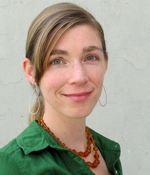 Dr. Christine Isborn, ARCS Scholar Alum
Dr. Christine Isborn, ARCS Scholar Alum
Professor of Chemistry and Biological Chemistry, UC MercedChristine Isborn, an ARCS alum from the University of Washington and now a Professor of Chemistry and Biological Chemistry at UC Merced, spoke at a recent General Membership Meeting. Christine‘s research focuses on modeling how molecules interact with light and simulating electronic properties of molecules and materials. A fourth-generation Californian, she has spent all of her academic life on the west coast, attending University of San Francisco for her B.S. and University of Washington for her Ph.D., and doing her post-doctoral research at Stanford. When not working, she is kept busy with two very energetic young boys, William and Joe, both of whom are named after academic mentors.
In discussing what being an ARCS Scholar has meant to her, Christine emphasized the advantage the ARCS award gave her when she was a PhD candidate, enabling her to start her research early and to maintain focus on her areas of research.
UC Merced, the Northern California Chapter’s most recent academic partner, has a high percentage of students from underrepresented groups and first-in-the-family college attendees. Christine noted that one of the advantages of working at UC Merced is that she not only helps her students achieve social mobility, but their entire families are also advanced in the process. She is passionate about helping graduate scholars to finish their PhDs.The membership was delighted to meet such an outstanding alum and to learn that she is carrying on the ARCS tradition of mentoring future young scientists!
Dr. Ahmed Kilani, ARCS Scholar Alum
President and Laboratory Director, Clongen Laboratories, LLCDr. Kilani holds a Bachelor's degree in Medical Technology from the Jordan University of Science and Technology, a Masters in Clinical Science from San Francisco State University and a Ph.D. in Infectious Diseases and Immunity from University of California at Berkeley, where he was an ARCS scholar from 1994 to 1999. He founded Clongen Laboratories (https://www.clongen.com/ ) in 1999 in Mountain View, California and has served as its President since 2004.
Dr. Kilani’s love for biology and nature became clear at a very young age and he found his happiness particularly in studying microbiology and virology with the goal of helping to diagnose infectious diseases and improve health. Since its founding, his laboratory has developed close to 300 different molecular-based diagnostic assays for infectious agents and is now known on the world stage as one of the top laboratories particularly when it comes to esoteric tests such as Mycoplasma detection.
His Ph.D. work in Dr. Fenyong Liu’s laboratory at UC Berkeley focused on creating variants of RNase P ribozyme using random mutagenesis to cleave specific substrates. By attaching a guide sequence to RNase P, they were able to create RNase P variants that can cleave specific substrates with high efficiency. One of the areas his work revealed is the unique enzyme-substrate binding sites through the use of UV crosslinking and structural biochemistry technique.
Of his ARCS Foundation award, Dr. Kilani notes that “It was an honor to have been selected and it gave me a deep sense of responsibility and determination to excel in science. The lasting impact I felt motivated me to continue working on areas directly related to what I learned during my graduate studies. I have been using my DNA cloning skills and plasmid construction at my laboratory all along. This would have not been possible without the knowledge I acquired in graduate school.”
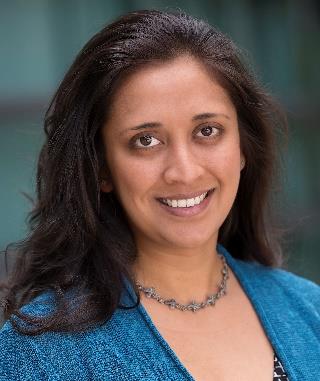
Ami Bhatt, ARCS Scholar Alum
Associate Professor of Medicine and of Genetics at Stanford UniversityAmi Bhatt, MD, PhD is an Associate Professor of Medicine and of Genetics at Stanford University. Her research focus is on microbial genomics, metagenomics, and global health, and she has won multiple awards for her academic scholarship, including being an Emerging Leader in Health and Medicine Scholar at the National Academy of Medicine. Her lab develops molecular and computational methods to investigate the intestinal microbiome, with a strong focus on: (a) developing methods to detect and follow microbes at the strain level through time and space, (b) detecting and understanding the contribution of mobile genetic elements to bacterial evolution and phenotypes, and (c) understanding how microbes use small proteins to communicate with one another and with the host. Outside of work, she enjoys being in the great outdoors, cooking and baking, and exploring new cultures through fiction, food and travel.
Dr. Bhatt was a biochemistry graduate student at UCSF from 2000-2005 and was an ARCS Scholar for one of those years. About her ARCS award, Dr. Bhatt says, “The ARCS scholar award was the very first academic grant I received in my training. It gave me the confidence that there was a place in science for me, and encouraged me to continue to pursue my research interests. I'm very grateful for this grant which helped paved the way for my career.”
Outside of her work at Stanford, Dr. Bhatt is very proud of the nonprofit organization that she co-founded, Global Oncology, Inc. This organization brings together professionals and students from all walks of life to improve cancer research, education, and care in under-resourced areas. As a group, they have helped cancer patients in countries like Botswana access life-saving cancer therapies that were previously too expensive to obtain and have also educated thousands of patients and families to help them understand their disease and its treatment effects. Most recently Global Oncology has focused on cervical cancer. This deadly and totally preventable disease disproportionately affects women in low- and middle-income countries such as Nigeria -- in fact, in Nigeria, one woman dies every hour of cervical cancer. To solve this problem, they have built an exciting grassroots campaign to educate the public about cervical cancer and its prevention by the HPV vaccine, while simultaneously working with governments, industry leaders, and community leaders to help make the HPV vaccine accessible in the countries like Nigeria where it is desperately needed. (http://cervicalcancerfree.org)
Barbara Jaca
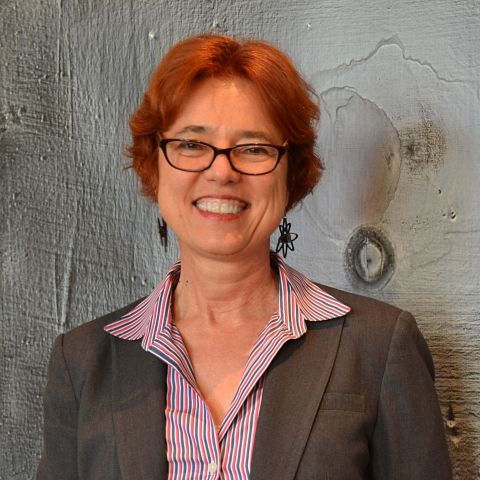 k, ARCS Scholar Alum
k, ARCS Scholar Alum
Nuclear Science Division at Lawrence Berkeley National LaboratoryFittingly for a self-confessed “nerd from an early age,” Dr. Barbara Jacak is now a senior scientist in the Nuclear Science Division at Lawrence Berkeley National Laboratory (LBNL) after serving as director of the division for six years. Also a physics professor at University of California Berkeley, Jacak says, “The most interesting questions in science are how do things work? How does the universe work? Why is it expanding?”
Her research has focused on quark gluon plasma, a so-called subatomic mix that contains the building blocks of visible matter and mimics conditions believed to exist in the early universe. The plasma can be formed in particle collider experiments in ultra-high temperatures (trillions of degrees). Jacak says in graduate school she “was interested in the forces inside the nucleus, but what got me really excited was nuclear matter.” The types of experiments done at colliders and accelerators take two or three years to design, then additional years to build, she adds.
Working at national labs, or doing research at their unique, sophisticated facilities, have been constants for the nuclear physicist. She is now designing experiments for a new collider planned for Brookhaven National Laboratory (BNL) in New York. The Electron-Ion Collider, expected to be finished by 2030, would provide new capabilities for exploring the behaviors of the fundamental particles and forces that bind atomic nuclei together. Despite the long process to build a flagship nuclear facility, Jacak says eventually scientists will have massive data – petabytes (which equals one million gigabytes) of information -- that will lead to hundreds of scientific papers.
Jacak’s work was recognized by the US Department of Energy’s Office of Science in 2019 when she was honored with the Distinguished Scientist Fellow Award. She was one of five scientists from DOE national labs who were inaugural recipients of the award.
An ARCS 2015 Hall of Fame honoree, Jacak was a Northern California Chapter ARCS scholar at University of California, Berkeley in 1975. “I want to thank ARCS. When I was getting started there weren’t many women in science,” she says. The ARCS recognition “told me I could do it.”She earned her PhD at Michigan State University. Jacak went to Los Alamos National Laboratory for her post-doctoral work, with the lure of an Oppenheimer Fellowship, and stayed there for twelve years in the Physics Division. When a professor position at State University of New York at Stony Brook opened up, Jacak jumped at the opportunity. The campus was in close proximity to Brookhaven, where she was involved with the PHENIX detector at the Relativistic Heavy Ion Collider. “Nature was kind and provided surprises for us,” she says, referring to the quark gluon plasma discovery. The RHIC collider will be partly integrated with the new collider at Brookhaven.
She describes national laboratories as “incubators for scientific teams. The labs are often called the crown jewels in the US research enterprise, and they really are.”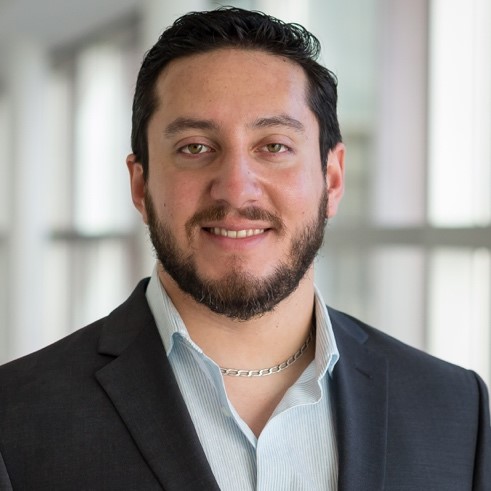 David Manosalvas-Kjono, ARCS Scholar Alum
David Manosalvas-Kjono, ARCS Scholar Alum
Co-Founder and CEO, Aeromutable Corp.David is an engineer, scientist, and entrepreneur who received his PhD in Aeronautics & Astronautics from Stanford University in 2018. His passion for deep tech and the development of energy-saving technologies to help the environment and the economy led him to his current position as co-founder and CEO of Aeromutable Corp., a trucking tech company bringing aerodynamic solutions for semi-trucks. Aeromutable has received multiple awards, including the Technology Transfer grant from the Stanford TomKat Center for Sustainable Energy, Chain Reaction Innovations US Department of Energy lab embedded entrepreneurship fellowship, first place at the 2020 Cleantech Open Regional pitch competition, and second place in the 2020 Cleantech Open National pitch competition, as well as a National Science Foundation SBIR grant.
David feels fortunate to be working towards developing technology that contributes to decreasing greenhouse gas emissions and increasing the profitability of the trucking industry. He is grateful for the team of amazing people that have contributed to this endeavor: an amazing co-founder, smart and hard-working contractors, and interns, and an incredible group of advisors. Outside of work and research David enjoys spending time with his family, visiting the San Diego Zoo, and exploring other pet and kid-friendly amenities in the San Diego area.
Of his ARCS Scholar Award, David says: “The support from ARCS afforded me the freedom to explore the use of computational tools to better understand the aerodynamic structures and overall behavior of ground vehicles. This unique opportunity allowed me to identify a technological gap in heavy-duty transportation and increased my interest in the industry. ARCS support during my PhD contributed towards my desire to start Aeromutable and helped me increase the impact my PhD research has had.”
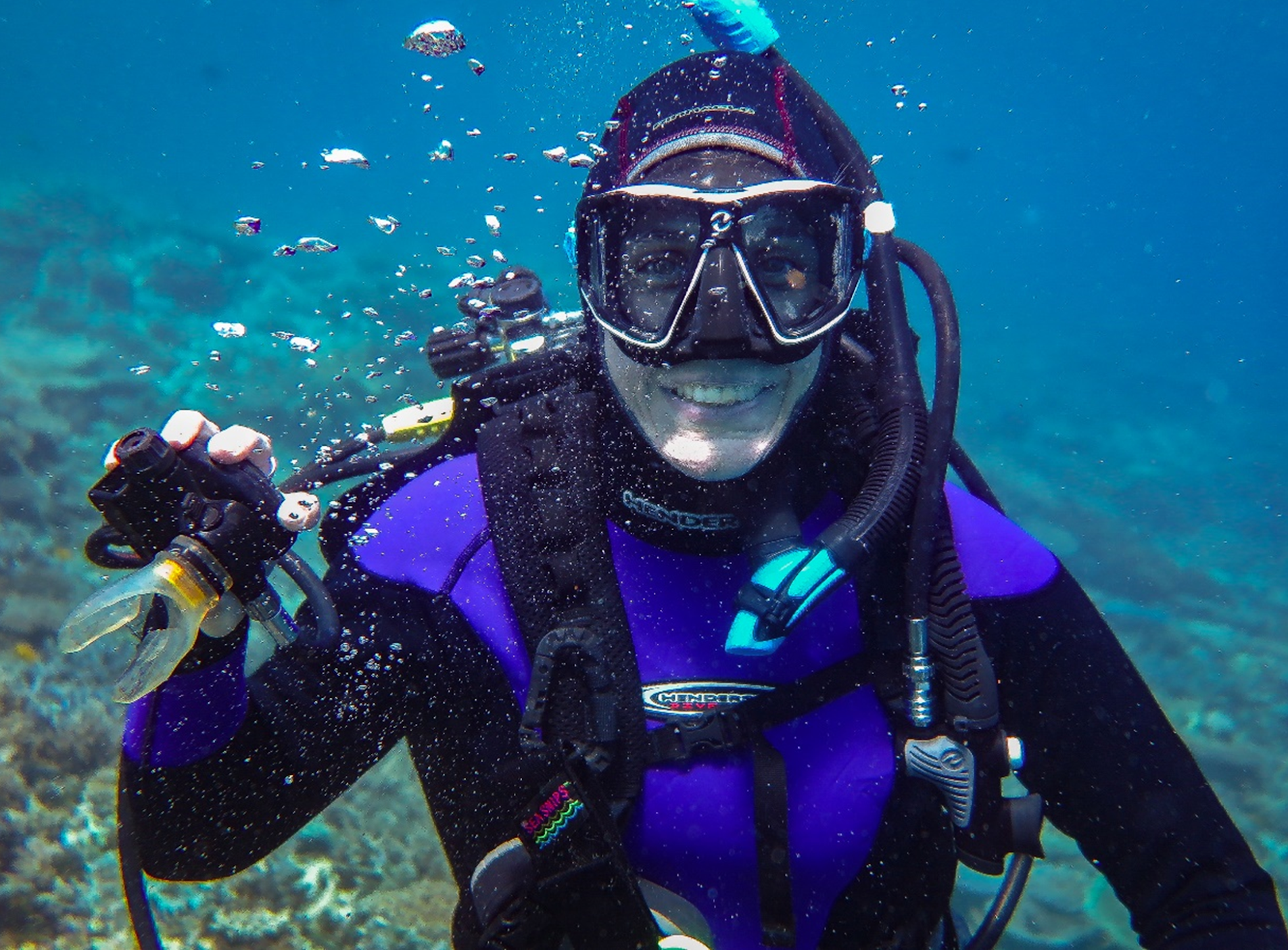 Dr. Helen E. Fox, ARCS Scholar Alum
Dr. Helen E. Fox, ARCS Scholar Alum
Conservation Science Director, Coral Reef AllianceDr. Fox, a UC Berkeley ARCS alum, has more than 20 years of experience working at the boundary of science and conservation, with geographic expertise in Indonesia and the Coral Triangle. Her work includes investigating links between marine protected area (MPA) management and governance, ecological impacts, and human well-being. She has received numerous grants and awards, authored more than 40 scientific publications, logged more than 1,000 dives, and once lived underwater for 10 days in the Aquarius habitat.
Dr. Fox did her PhD investigating coral reef recovery and rehabilitation from destructive fishing in Indonesia. She did most of her fieldwork in Komodo National Park, collaborating with the Park authorities and The Nature Conservancy. Blast fishing (homemade bombs that when detonated would kill fish and shatter coral skeletons) was illegal but had been common until stopped with better management, including patrols. Chronic, large-scale blasting had transformed beautiful, complex reefs into flat, mostly lifeless rubble fields. Her research showed how natural coral recovery was prevented by the shifting rubble in the water currents burying or abrading new coral recruits. She also developed low-tech, locally available coral reef rehabilitation options, scaling up the most successful approach.
Of her ARCS experience, Dr. Fox says, “I am so grateful for the ARCS Foundation award: it was my first research grant, and as such was a tremendous help in getting my research in Indonesia started. It allowed me to take my first field trip, develop my hypotheses, set up initial research plots, try out survey methods, and collect pilot data. I am convinced that it was being able to make this initial trip that led to my future funding success, as I received several grants after the ARCS fellowship.”
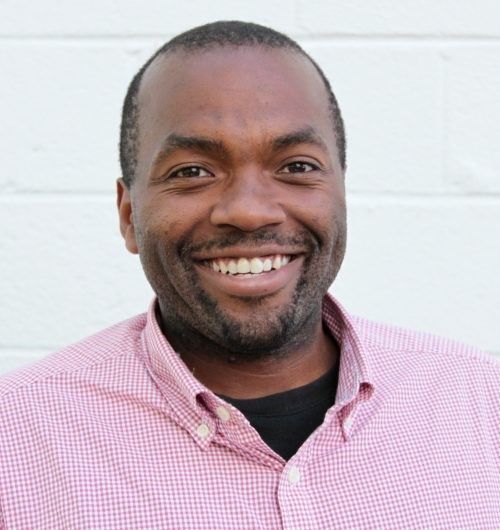 Nsikan Akpan, ARCS Scholar Alum
Nsikan Akpan, ARCS Scholar Alum
Health & Science Editor for New York Public RadioA 2013 ARCS Scholar and alum of the Science Communication program at the University of California, Santa Cruz, Nsikan is the health and science editor for New York Public Radio. Before joining WNYC, he was a science editor at National Geographic, where he led the science desk's coverage of the COVID-19 pandemic. Prior to that, he worked as the digital science producer for PBS NewsHour, where he co-created the YouTube series ScienceScope. He has also worked for Science Magazine, Science News Magazine, and NPR. His reporting has garnered an AAAS Kavli Science Journalism Award, a George Foster Peabody Award, and an Emmy Award for News & Documentary. Before journalism, he earned a doctorate in pathobiology from Columbia University, where he studied neurological conditions like stroke and Alzheimer's disease. His research pursuits also touched on infectious disease.
Nsikan says, “The ARCS award laid the foundation for all of my professional success. When I applied to the Science Communication program at the University of California, Santa Cruz, I had recently finished my doctorate--in other words, I was fairly broke. I wouldn't have been able to afford the program without ARCS support and my program director Rob Irion, who pushed me to apply. Besides the financial assistance, I enjoyed meeting the other ARCS scholars at the annual banquet and hearing about their amazing science journeys.”
Asked to describe one life accomplishment he’d like to share with young ARCS scholars and the ARCS Foundation, Nsikan replied that while working as a science producer for the PBS NewsHour, he traveled about 1,000 feet underwater off Bermuda's coast for a story about climate change and coral migration, adding that “It was the coolest experience of my life.”
https://youtu.be/oQUSmAXxXRk
https://www.pbs.org/newshour/science/great-migration-save-coral-bleaching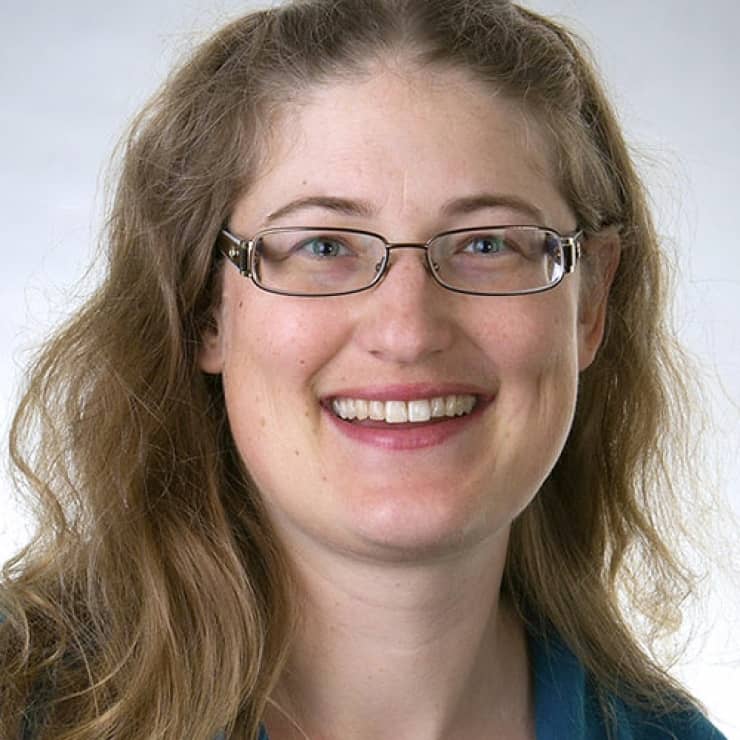
Allison Luengen, ARCS Scholar Alumna
Postdoctoral Researcher, School of Marine and Atmospheric Sciences Stony Brook University, NY"If you’ve been to San Francisco Bay recently, you’ve probably noticed the posted fish consumption advisories. One of the reasons that people are warned to limit their consumption of fish from the San Francisco Bay is the high concentrations of mercury that can be found in some fish, particularly large fish at the top of the food chain.
Despite the high concentrations of mercury in the fish, little is known about how mercury enters the food chain. The first, and most critical step, is the transfer of mercury from water to phytoplankton, which are the microscopic algae at the base of the marine food chain. My current research focuses on this first step, where phytoplankton can concentrate mercury by up to 100,000 times the levels found in the water.
I’m very excited to have the opportunity to study mercury pollution as a postdoctoral researcher. I am currently collaborating with two different research groups, one at Stony Brook University in New York and the other at the United States Geological Survey in Sacramento. Upon completion of my postdoc, I am planning to apply for academic jobs with a combination of teaching and research.
Getting my current position would not have been possible without the support I received along the way. ARCS Foundation supported me as I finished my M.S. in Marine Sciences at the University of California, Santa Cruz (UCSC). After completing my M.S., I went on to earn a Ph.D. in Environmental Toxicology, also from UCSC. Those were some challenging years for me, and every bit of support that I received helped me finish graduate school.
Now, as a woman in a male-dominated field, I hope that during my career, I can both make important scientific discoveries and also make the field more accessible to women and other underrepresented groups. By funding scientists as they struggle through graduate school, ARCS Foundation has taken a vital step in this direction. I thank ARCS Foundation for the support that I have received and for making it possible for more people to become scientists."
-
